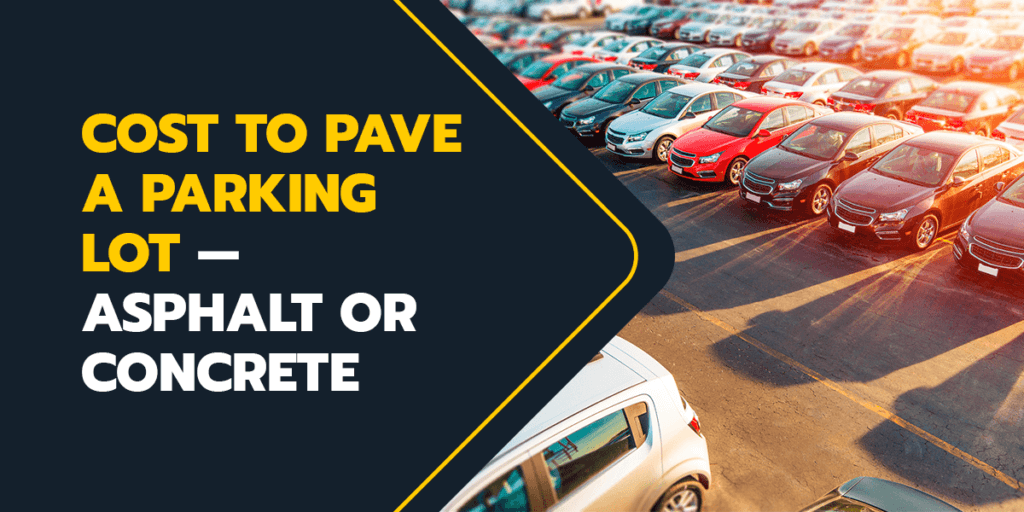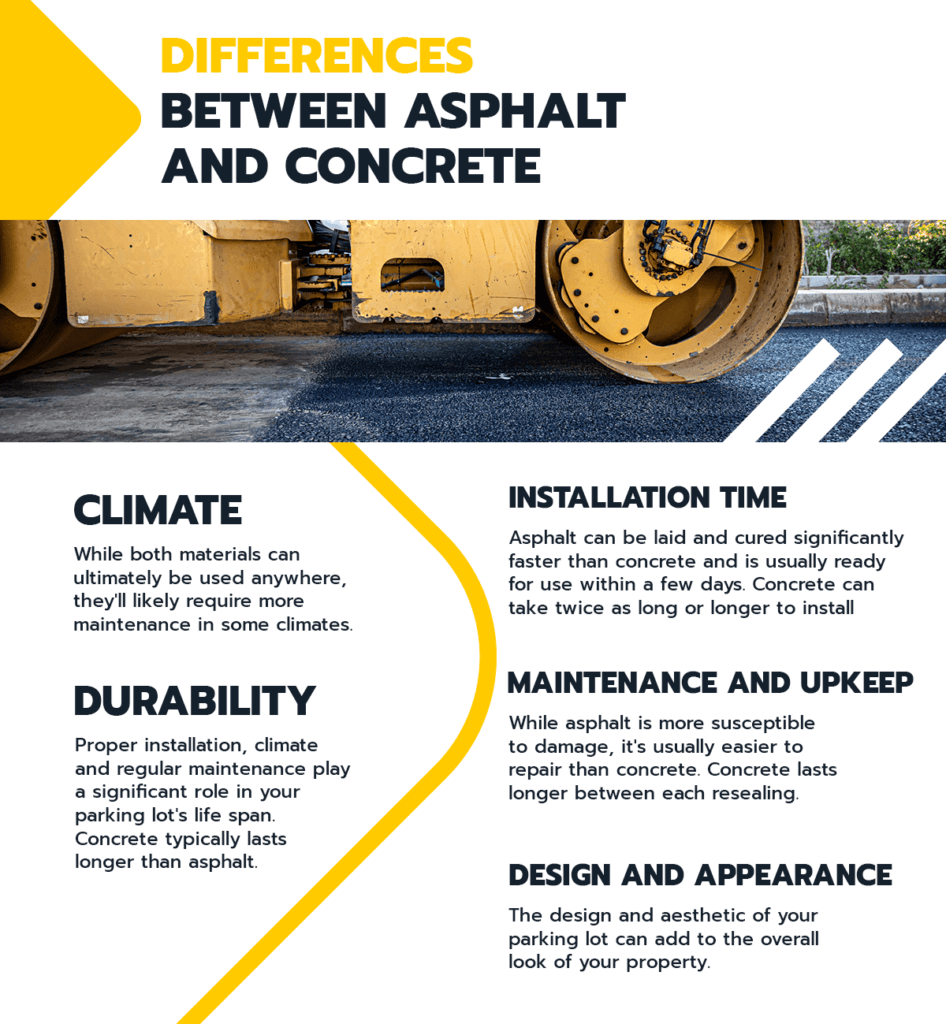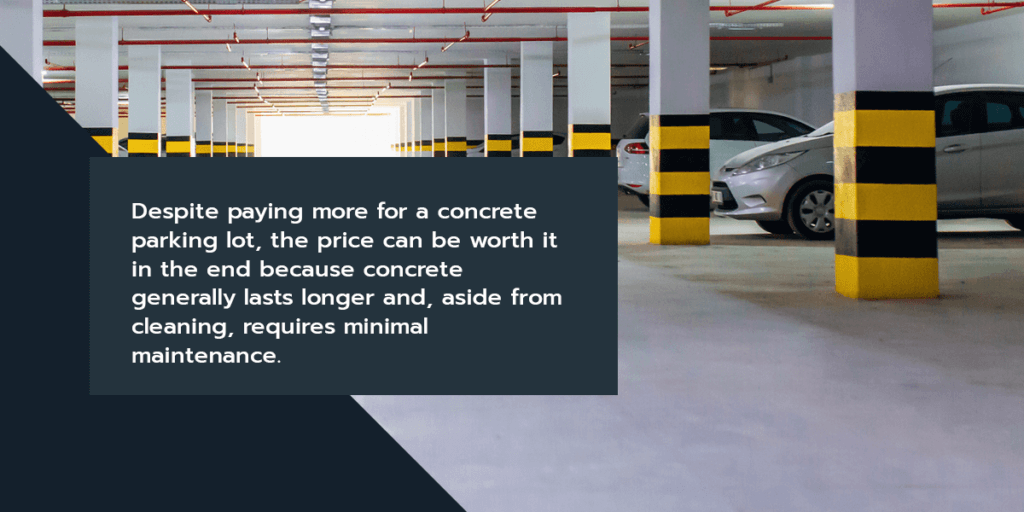
If you’re planning on paving a parking lot, you’re likely contemplating asphalt or concrete as the paving material. While the cost of each is one significant deciding factor, several other considerations should factor into your decision, including maintenance requirements, durability and how long installation will take.
Learn more about determining the best paving material for your commercial parking lot, as well as some pros and cons of each material.
Differences Between Asphalt and Concrete
Asphalt and concrete are both made of sand and a stone aggregate, though the differences begin with what binds the mixture together. Asphalt commonly contains tar or bitumen to bind the materials, while concrete uses cement to bind sand and stone.
From there, the differences continue, creating two options for commercial parking lot paving. Consider these key factors:
Climate
When choosing a paving material for your parking lot, one of the first things you should consider is the climate your parking lot will reside in. While both materials can ultimately be used anywhere, they’ll likely require more maintenance in some climates.
For example, asphalt tends to get hot and sticky in warm climates because it absorbs a lot of heat due to its dark color. In cold temperatures, concrete may crack more easily because of freeze-thaw cycles and the salt used to melt snow and ice, which may deteriorate concrete.
Installation Time
Depending on how quickly you need to start using your parking lot, installation time may be a big deciding factor. Asphalt can be laid and cured significantly faster than concrete and is usually ready for use within a few days. Concrete can take twice as long or longer to install and takes at least a week to cure before being used.
Installation time can also depend on the time of year you’re having the job done.
Maintenance and Upkeep
As with any building or construction material, concrete and asphalt are susceptible to damage over time. Maintenance and preventative upkeep ensure your parking lot looks good and lasts longer.
Asphalt parking lots need resurfacing every few years, and concrete parking lots should be resealed. While asphalt is more susceptible to damage, it’s usually easier to repair than concrete. Concrete lasts longer between each resealing, though its light color shows stains from oil and other spills, requiring more extensive cleaning to maintain its appearance.
Durability
Durability is a huge factor to consider because you want to ensure you’re using a material that will last years to come. Proper installation, climate and regular maintenance play a significant role in your parking lot’s life span. Concrete typically lasts longer than asphalt under the right conditions and with regular maintenance.
Design and Appearance
Your parking lot is often one of the first things people see when they come to your building. The design and aesthetic of your parking lot can add to the overall look of your property. Asphalt is pretty straightforward with its dark colors, creating an aesthetic contrast when installed near lightly colored commercial buildings.
Concrete offers a few more design possibilities since it can be stamped, tinted and stained in a variety of colors and shades.

How Much Does Paving a Parking Lot Cost?
Another important difference between paving your parking lot with asphalt or concrete is the price of installation and repairs. The prices vary depending on the size of your project, any additional designs and the cost of the professional paver.
Consider the parking lot paving costs of installation and repairs, taking into account that asphalt is typically more cost-effective to install, and professional help is necessary for extensive repairs.
Concrete is usually more costly to install, and maintenance may cost higher if repairs are needed.
Other factors that play a part in parking lot costs include:
- Your parking lot’s square footage, shape and depth.
- Your location.
- Any unique terrain challenges, like slopes.
Concrete vs. Asphalt Parking Lot — Pros and Cons
Asphalt and concrete are both useful materials for paving, and they each have their respective pros and cons. Concrete and asphalt each have a place as effective paving materials, though one may be better for certain situations. Weigh the pros and cons of each and compare them to what you want and need for your parking lot.
Pros and Cons of Asphalt
Asphalt is an affordable and sustainable material, and it can be recycled. It requires minimal time for installation, allowing you to open your parking lot to customers and visitors sooner. Asphalt’s darker color makes it easier to see the lines in bad weather or darkness, while its texture provides protection against sliding and even helps reduce noise from traffic.
Asphalt also absorbs a lot of heat, which typically requires repairs and resurfacing more often and might be uncomfortable on bare skin.
Pros and Cons of Concrete
Despite paying more for a concrete parking lot, the price can be worth it in the end because concrete generally lasts longer and, aside from cleaning, requires minimal maintenance. You can also add designs and colors to concrete to make it look like stone or brick to match your property’s aesthetic.
However, concrete is more susceptible to cracking and degradation in colder climates and stains easily.
Ultimately, neither option is the best all of the time. Base your decision on your budget, climate and willingness to keep up with maintenance.

Contact us for Commercial Parking Lot Paving Costs
Wondering whether asphalt or concrete is right for your parking lot? Talk to the paving professionals at The Paving Lady for help deciding on the best material for your property. Whether you’re paving a new parking lot or expanding your current one, we have the paving and repair services to help you every step of the way.
From parking lot maintenance to seal coating and line striping, The Paving Lady is your one-stop shop for commercial parking lot paving.
For more information about paving materials or techniques, or to request a quote for your project, contact our team today!
